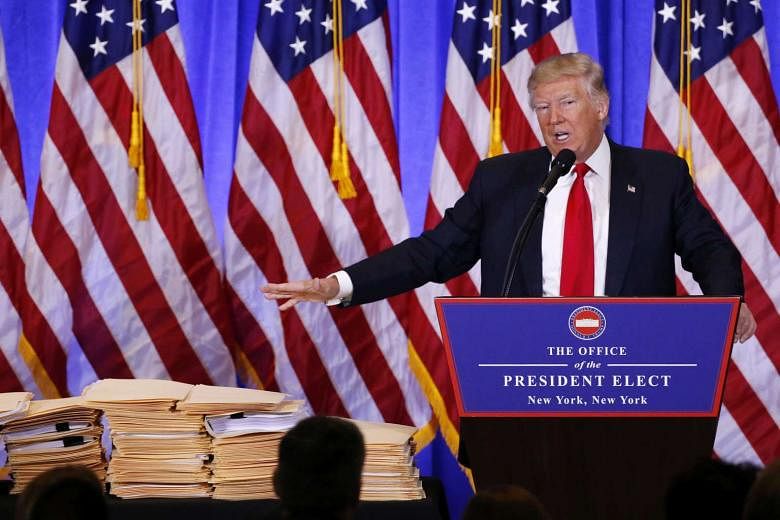WASHINGTON - US President-elect Donald Trump will be ready for the first order of business as soon as he is sworn in on Friday (Jan 20) - signing executive orders.
Mr Trump has said time and again he will do this and that on "Day One" and has a strong agenda for his first 100 days.
He wants to repeal Obamacare; formally opt out of the Trans Pacific Partnership; renegotiate the North American Free Trade Agreement; appoint a conservative Supreme Court justice; deport illegal immigrants with criminal records; raise tariffs on imports from China and Mexico; and build a wall on the Mexican border.
All of that can be set in motion within days.
Mr Trump also wants to slash individual and corporate tax rates, cut red tape and lift federal environmental regulations, to stimulate the energy and manufacturing sectors. He also wants to unleash a multibillion-dollar infrastructure spending spree, roping in the private sector to invest with the lure of tax breaks.
Much of President Barack Obama's legacy - like Obamacare and the ban on drilling for oil in the Arctic - is under threat. But in cases such as environmental legislation, a rollback may be challenged in court, delaying the process.
Legislation on an infrastructure plan can be expected a few months into the new Trump administration, analysts say, though work on the planning and financing will begin in the first 100 days. Mr Trump has floated a US$1 trillion (S$1.43 trillion) proposal that will offer federal tax credits to private companies which invest in infrastructure. This may find more common ground with the Democrats, who tried to push infrastructure spending under Mr Obama, only to see it stalled in Congress by the Republicans.
The Obamacare issue may be the most contentious.
Republicans have already begun the long process of repealing the Affordable Care Act, commonly called Obamacare. The House on Friday (Jan 13) voted to clear the way to unwinding the legislation. Repealing it without an adequate replacement, however, risks jeopardising health insurance for millions of Americans, turning it into a political disaster.
Already, protests against its repeal are scheduled this weekend.
There is bipartisan concern about the consequences of an abrupt repeal, which would cast millions into the open insurance market with no rules against refusing customers. Such an outcome would leave nobody better off and Mr Trump would see a campaign pledge backfire. He and Speaker Paul Ryan have said they will repeal and replace virtually simultaneously, but no details on a replacement scheme have been forthcoming.
In foreign policy, the world will be watching very closely. Mr Trump's tough talk on trade with China and Mexico, his right-wing choice for Ambassador to Israel - and his insistence on moving the US Embassy from Tel Aviv to Jerusalem; his intent to review a deal with Iran and to reset relations with Russia, have raised eyebrows and apprehensions.
"Here in Washington, on the eve of Inauguration Day, the mood alternates between euphoria and foreboding, depending on political affiliation,'' Mr Michael Kugelman, a senior associate at the Woodrow Wilson Centre, said in an e-mail.
"There's also a lot of anxiety because Trump, the ultimate wildcard president - we simply have no idea what we will get - will soon have to start showing his cards and unveil his priorities and policies."
Mr Stephen Fuller, professor of public policy at George Mason University, told The Straits Times in a phone interview that Mr Trump was under tremendous pressure.
But he added: "Trump is a bad loser. He needs to be a winner. And he is a smarter person than many give him credit for. But he is going to be a one-term president unless he brings people together."


